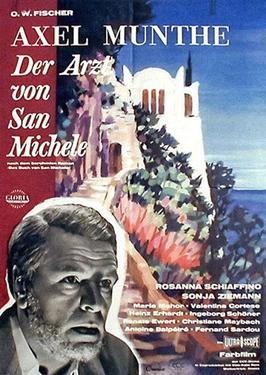Axel Munthe, The Doctor of San Michele
Axel Munthe (1857–1949) was a Swedish physician, psychiatrist, and author, best known for his book The Story of San Michele, an autobiographical account of his life and work. Born in Oskarshamn, Sweden, Munthe went on to study medicine at the University of Uppsala and later in Paris, France, where he was deeply influenced by the city's culture and medical advancements.
Early Life and Education[edit | edit source]
Axel Martin Fredrik Munthe was born on October 31, 1857, in Oskarshamn, Sweden. He was the eldest son in his family and showed an early interest in medicine, inspired by his father, who was a pharmacist. Munthe pursued his medical studies at the University of Uppsala before moving to Paris to continue his education. In Paris, he was exposed to the forefront of medical science and developed a keen interest in neurology and psychiatry.
Career[edit | edit source]
Munthe's medical career was distinguished by his compassionate approach to treatment, especially towards the poor and marginalized. He worked in various parts of Europe, including France, Italy, and Sweden, providing medical care to a wide range of patients. Munthe was particularly interested in the treatment of hysteria and neurological disorders, areas in which he made significant contributions.
In addition to his medical practice, Munthe was an avid animal lover and conservationist. He advocated for the protection of animals and was known for his efforts to save the birds of Capri from being hunted. His love for animals and nature is a recurring theme in his writings.
The Story of San Michele[edit | edit source]
Munthe's most famous work, The Story of San Michele, was published in 1929. The book is a memoir that recounts his experiences and observations throughout his life, focusing particularly on the time he spent in Italy, where he built the Villa San Michele on the island of Capri. The villa, designed by Munthe himself, is a reflection of his interests in art, architecture, and antiquities. The Story of San Michele has been translated into many languages and remains a popular read, offering insights into Munthe's life philosophy, his medical practices, and his passion for art and nature.
Legacy[edit | edit source]
Axel Munthe's legacy is preserved in the Villa San Michele, which is now a museum open to the public. His contributions to medicine, particularly in the fields of psychiatry and neurology, are remembered for their emphasis on humane treatment and compassion. Munthe's work in animal conservation, especially his efforts to protect the wildlife of Capri, has also left a lasting impact.
Death[edit | edit source]
Axel Munthe died on February 11, 1949, in Stockholm, Sweden. His life and work continue to be celebrated for their humanitarian values, contributions to medicine, and the arts.
Search WikiMD
Ad.Tired of being Overweight? Try W8MD's physician weight loss program.
Semaglutide (Ozempic / Wegovy and Tirzepatide (Mounjaro / Zepbound) available.
Advertise on WikiMD
|
WikiMD's Wellness Encyclopedia |
| Let Food Be Thy Medicine Medicine Thy Food - Hippocrates |
Translate this page: - East Asian
中文,
日本,
한국어,
South Asian
हिन्दी,
தமிழ்,
తెలుగు,
Urdu,
ಕನ್ನಡ,
Southeast Asian
Indonesian,
Vietnamese,
Thai,
မြန်မာဘာသာ,
বাংলা
European
español,
Deutsch,
français,
Greek,
português do Brasil,
polski,
română,
русский,
Nederlands,
norsk,
svenska,
suomi,
Italian
Middle Eastern & African
عربى,
Turkish,
Persian,
Hebrew,
Afrikaans,
isiZulu,
Kiswahili,
Other
Bulgarian,
Hungarian,
Czech,
Swedish,
മലയാളം,
मराठी,
ਪੰਜਾਬੀ,
ગુજરાતી,
Portuguese,
Ukrainian
Medical Disclaimer: WikiMD is not a substitute for professional medical advice. The information on WikiMD is provided as an information resource only, may be incorrect, outdated or misleading, and is not to be used or relied on for any diagnostic or treatment purposes. Please consult your health care provider before making any healthcare decisions or for guidance about a specific medical condition. WikiMD expressly disclaims responsibility, and shall have no liability, for any damages, loss, injury, or liability whatsoever suffered as a result of your reliance on the information contained in this site. By visiting this site you agree to the foregoing terms and conditions, which may from time to time be changed or supplemented by WikiMD. If you do not agree to the foregoing terms and conditions, you should not enter or use this site. See full disclaimer.
Credits:Most images are courtesy of Wikimedia commons, and templates Wikipedia, licensed under CC BY SA or similar.
Contributors: Prab R. Tumpati, MD

